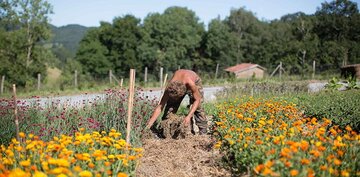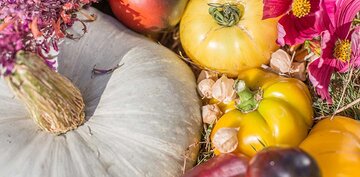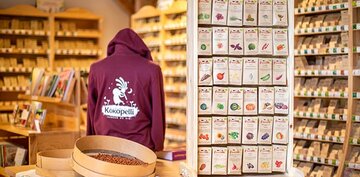

Over 75% of cultivated biodiversity has disappeared, primarily due to the agro-industrial practices of European farms. Kokopelli is a French association dedicated to promoting heirloom seeds since 1999.
Today, we preserve thousands seeds varieties, including 400 varieties of tomatoes seeds, and offer for sale each year between 1,600 and 2,000 references.
Heirloom seeds are open-pollinated plants passed down through generations, known for their rich, complex flavors and diverse shapes, sizes, and colors. These seedlings adapt well to local conditions, and their seeds can be saved and replanted to produce true-to-type offspring. In contrast, hybrid varieties are created by cross-pollinating different parent plants trying to achieve specific traits like uniformity, disease resistance, and high yield. While hybrids are often easier to grow commercially, their flavor are less complex, and seeds from hybrids result in plants that are markedly different from their parent plants.
How do heirloom seeds contribute to biodiversity in home gardens?
Heirloom seeds contribute to biodiversity in home gardens by preserving old and rare plant varieties that are not typically found in commercial agriculture. By growing heirloom seeds, gardeners help maintain genetic diversity and protect plant species from extinction.
How can I ensure high germination rates with heirloom seeds?
To achieve high germination rates, store your seeds in a cool, dry place until planting. Ensure your garden soil is well-aerated and moist. Remember, proper planting depth and timing are critical; refer to the seed packet for specific instructions tailored to each variety.
Why should gardeners consider using heirloom seeds?
Gardeners should consider using heirloom seeds because they offer a wide range of old-fashioned flavors and heritage varieties, providing a unique and diverse selection of vegetables to grow in their gardens.
Can I save seeds from heirloom plants?
Absolutely! One of the most rewarding aspects of growing heirloom plants is the ability to save seeds from year to year. Since these plants are open-pollinated, seeds collected from your garden will produce plants similar to the parent plant. This practice not only saves money but also gradually creates a seed stock specially adapted to your local growing conditions.
2025 Edition : Marigold, calendula officinalis
Cultivons-Nous campaign : For the liberation of Médicinal PlantsOur seed outlets
View mapKokopelli on the road!
Discover the tour!Seeds Without Borders
Our solidarity campaignContents1 Onion varieties1.1 White onions 1.2 Yellow onions1.3 Pink and red onions2 Growing onions2. [...]
For a successful vegetable garden, it's essential to take into account the sowing calendar. However, [...]
Contents1 How to care for your vegetable garden in August 2 What to sow in August 2.1 Sowing in Augu [...]






